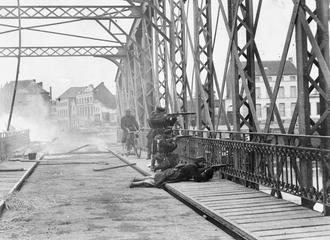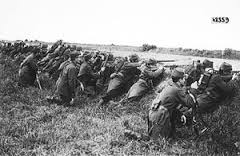French troops shattered; Prisoners shot; First British Soldier Killed
Special to The Great War Project
(21 August) Things continue to worsen for the French.
Yesterday, this date a century ago, near the northern French town of Morhange, “French troops were shattered as they charged uphill into machine-guns,” according to one historian. 20,000 French troops taken prisoner.
Today a century ago, they try again in the wooded Ardenne of northeast France. But there too they are simply outgunned by the German artillery.
Today another battle is emerging at the Sambre River, whose bridges are a crucial link between Belgium and France. The French want to hold those bridges. But they don’t have the troop strength to hold them all. The Germans seize key points across the river.
It’s bad news for the French.
Over the next two days, fighting here and at other border points will coalesce as one of the bloodiest battles of the war, the Battle of the Frontiers.
By this time, the third week of the war, the French lose two sectors of their front – the Ardennes and Alsace-Lorraine. It is a bad start by the French and it will get worse, much worse. Where the French Second Army withdraws is a small town called Sarrebourg. Historian Martin Gilbert reports that on 21 August, seven French soldiers are killed after they surrender.
Several German troops refuse to carry out orders to shoot the prisoners.
“The episode,” writes Gilbert, “was one of the very few that led to a war crimes trial after the war.”The accused are German officers and they will be tried in a German court.
On this same day, a young German platoon commander on his own twice opens fire on a cluster of French soldiers at the Belgian border. He and his men capture half the village where he encounters the French. He is Erwin Rommel who will become famous worldwide in the next war.
British troops are now making their presence felt. On the night of 21 August, near a Belgian village, a British private named Parr takes a bicycle to scout nearby territory. According to historian Gilbert, he disappears. Parr is almost certainly the first British soldier to be killed in the First World War, Gilbert writes.
He is buried in a German war cemetery in Belgium.


